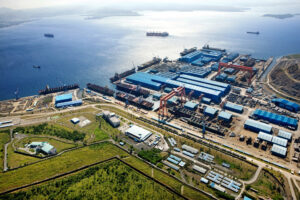Trump trade policies may benefit PHL maritime sector
THE PHILIPPINES could benefit from US President Donald J. Trump’s trade policies, including his push to revitalize Washington’s shipbuilding industries and improve gas exportation reach, according to the US-based Heritage Foundation.

By Kenneth Christiane L. Basilio, Reporter
THE PHILIPPINES could benefit from US President Donald J. Trump’s trade policies, including his push to revitalize Washington’s shipbuilding industries and improve gas exportation reach, according to the US-based Heritage Foundation.
The US could partner with other countries including the Southeast Asian nation to help decouple its reliance on Beijing’s battery technologies, Brent Droste Sadler, a senior research fellow at the foundation, told a security forum in Manila on Tuesday.
“One of [Mr. Trump’s] top priorities is the maritime industry, [including the] shipbuilding and shipping sectors,” he said. “That’s an opportunity for partnering and working with countries like the Philippines, a merchant mariner powerhouse in the global stage.”
The US commercial shipbuilding sector has weakened in the past decades, with Washington now only able to build fewer than five ships a year from 70 in 1975, according to former US Trade Representative Katherine Chi Tai. Beijing can build about 1,700 ships yearly.
Mr. Sadler said he expects Mr. Trump to issue executive orders that would help kickstart Washington’s revitalization efforts for its shipbuilding industry, which he described as “strategically important” for the country.
The Trump administration would likely push the quick approval of the Ships for America Act, a bipartisan bill touted to improve the US commercial maritime industry, he said.
The Philippines could also benefit from Washington’s push to develop liquefied natural gas (LNG) facilities to aid its gas exports, said Lucian Pugliaresi, president at Energy Policy Research Foundation.
“It’s an enormous opportunity for Asia,” he told the same forum. “The US has an opportunity, particularly in the Philippines… for the development of new LNG supplies.”
The US is the world’s largest LNG exporter, shipping 88.3 million tons of the cooled gas last year alone. Mr. Trump lifted an LNG export moratorium signed by his predecessor as part of efforts to increase US energy output.
Former US President Joseph R. Biden put a stop on the processing of LNG export permits in early 2024, citing the need to study its environmental and economic effects.
Washington should help improve Manila’s energy prospects by developing LNG structures in the Southeast Asian nation to help ensure continuous shipments of the super-chilled gas in case conflict in the South China Sea erupts, according to a 2024 Center for Strategic and International Studies report.
The Philippines could also benefit from the efforts of western countries to cut their reliance on Chinese batteries, said Dave McMurtry, a board member of the US National Battery Association.
“Countries like the US, the European Union, Japan and others must ramp up investment in lithium battery manufacturing and mining operations,” he told the forum, citing the need to build large battery factories and improve mineral extracting and refining capabilities.
“I’ve toured the Subic Bay Freeport zone, and I think it’s an excellent candidate for multilateral investment in battery capacity,” he added.
Beijing has a foothold over the battery supply chain, controlling at least 85% of its global production. The extraction and processing of critical minerals such as lithium is also “highly concentrated” in China, according to the International Energy Agency.
“Over-reliance on China for lithium-ion battery supply chains could have three big impacts,” said Mr. McMurtry, noting how it could affect the green energy transition and risk supply chain disruptions and market manipulation.
“As nations, we cannot afford to leave this critical supply chain in the hands of a single player, especially one with strategic interests that may not align with our own,” he added.
China on Tuesday announced export restrictions on five metals used across defense, clean energy and other industries minutes after an additional 10% tariff on Chinese goods imposed by Mr. Trump came into effect.
The restrictions are the latest attempt by China since 2023 to leverage its dominance in the mining and processing of critical minerals used in everything from smartphones and electric car batteries to infrared missiles and ammunition.
However, the new rules stop short of outright export bans, which China has previously used against the US, in a continuation of Beijing’s more measured response to the latest round of trade tensions with Washington. — with Reuters


















